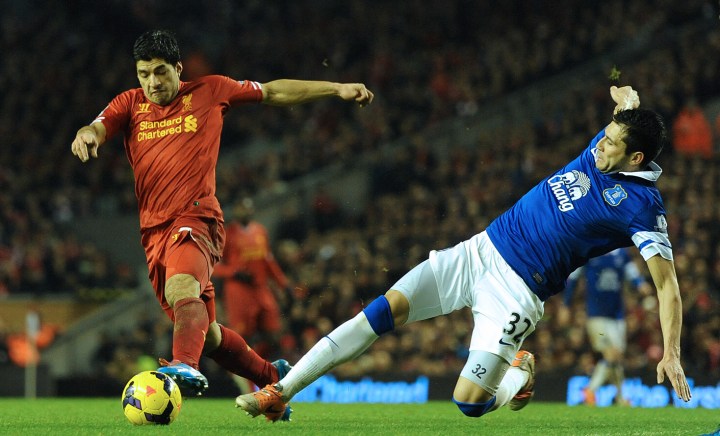Sport
Soccer’s diving – can the illness be remedied?

Diving continues to irk and frustrate soccer fans and far too much time is spent debating the issue rather than finding a way to solve it. In fact, it’s one of the simplest things to solve, if only the game’s rule-makers would apply a little bit of logic. By ANTOINETTE MULLER.
“Diving their way to the title,” was a comment which popped up on social media networks when Liverpool were coasting towards what could be a deciding 3-2 victory over Manchester City over the weekend.
It’s a debate that has raged on across soccer for many years – yes, even has far back as 1960s, when the Italian and Spanish players were routinely accused of diving their way to victory. It’s a debate worth having because, like over-rates in cricket, diving is becoming a little issue which takes up a lot of talking time when there are things like match-fixing, discrimination and other serious issues to focus on.
Diving, or trying to win a decision in favour of your team, has become part and parcel of the modern game for some players. Players are more likely to get away with a dive than they are with a dangerous, possibly career-ending tackle, even if their reputation then goes on to precede them.
This becomes a problem because sometimes when a player with a reputation for being fouled is genuinely fouled, referees might wave it off as theatrics. Liverpool certainly have a few players with “reputations”, but that kind of blaming and finger pointing is no good for the game. The fact is simple: diving is a universal problem and it has a universal impact. It needs to be universally addressed without reputation chasing and stigmatising.
Sure, some players are more guilty than others. From August 2008 to January 2014, Gareth Bale had earned himself seven red cards for simulation. Fernando Torres and Adnan Januzaj had both earned three and a handful of others earned two.
Diving has always been a bookable offence under the FA’s unsporting behaviour law, but in 2008 mandatory yellow cards were introduced for simulation in a bid to combat the problem. It clearly hasn’t helped all that much since referees sometimes can’t tell and sometimes they do things based on reputations.
In order to rid the sport of the horror that is diving so that energy can be focused on more serious issues, the punishment needs to be more streamlined. Some actions have been considered in the past, some have been tried by other leagues across the world and some won’t see the light of day under Fifa’s current regime.
Here are some suggestions:
Sin bin players and fine them afterwards
Anybody who was brought up on a steady diet of rugby-watching often pull their noses up in disgust at soccer, wondering: how can players act like that towards the referee? Far too often it looks like a group of adolescents arguing during a school break. A good start would be to only let the captains talk to the ref, but that might be too much of a system-shock for players. So, soccer can take something else from rugby: sin bins. Yellow cards are already handed out, but because the risk is worth the punishment, there is no risk involved at all. It takes a brave referee to dish out a yellow for simulation and it doesn’t have that much of an impact on the game. Instead, sin bins might be an option. Again, it will take brave referees to dish them out, but the impact of having a player sin-binned for 15 minutes will impact the game far more than simply a yellow card. This, of course, still holds the issue of reputation bias and, if a referee gets a diving decision wrong, it could make a lot of people very angry. There is a simple solution: a third match official with instant access to review the situation. Many argue that this will slow the game down too much but with all the protest-yapping soccer players do, there’s enough time for a TMO to reach a decision. Dave Whelan, the owner of Wigan Athletic, supports the notion of in-play video reviews, saying: “We have to say to Mr Blatter, whatever you say, the Premier League will help our officials with more technology. Tennis, cricket, rugby league: why not football? Why can’t we get the decisions 99.9% correct?” If a player is then sin-binned, they should be fined and suspended, but not before assessing the situation through the next solution.
Retrospective video evidence and punishment
The thing with fining players is that it their salaries are so astronomical, they hardly feel the pinch. However, copping a two-match ban for channelling a rendition of Swan Lake isn’t going to make your team boss too pleased. Many prominent football bosses – like Arsene Wenger, Tony Pulis and David Moyes support the post-match punishment, but it is not without its flaws. The panel who reviews the evidence has to be neutral. Roy Hodgson had previously said: “It will raise to some extent questions, sometimes, about delegates and assessors, such as are they local people seeing things with local eyes, or are they as neutral as we hope the referees will be?”
That’s a fair enough point but it’s a system that has already been introduced in Major League Soccer and it’s working out okay. However, there is a problem with assessment with this system because what punishment befits what crime? There are different degrees of diving and the post-match punishment system will have to be quite clear where it draws the line.
Stick an extra ref behind the goal
This is something Michel Platini has touted as the solution for all the wrongs in soccer. It’s something that has been tried a few times and while Uefa will bang the success drum, it’s really didn’t make that much of a difference when it was trialled during the Champions League. Yes, it might be easier to spot, but that is not going to rid the sport of the ingrained mentality that diving comes with very little punishment. It’s a bit like drinking Aspirin for an ingrown toenail. Players need to be made accountable for their actions through a decision that impacts on the whole team. DM
Photo: Liverpool’s Luis Suarez ( L ) in action with Everton’s Antolin Alcaraz ( R ) during their English Premier League soccer match at Anfield, Liverpool, Britain, 28 January 2014. EPA/PETER POWELL



















 Become an Insider
Become an Insider